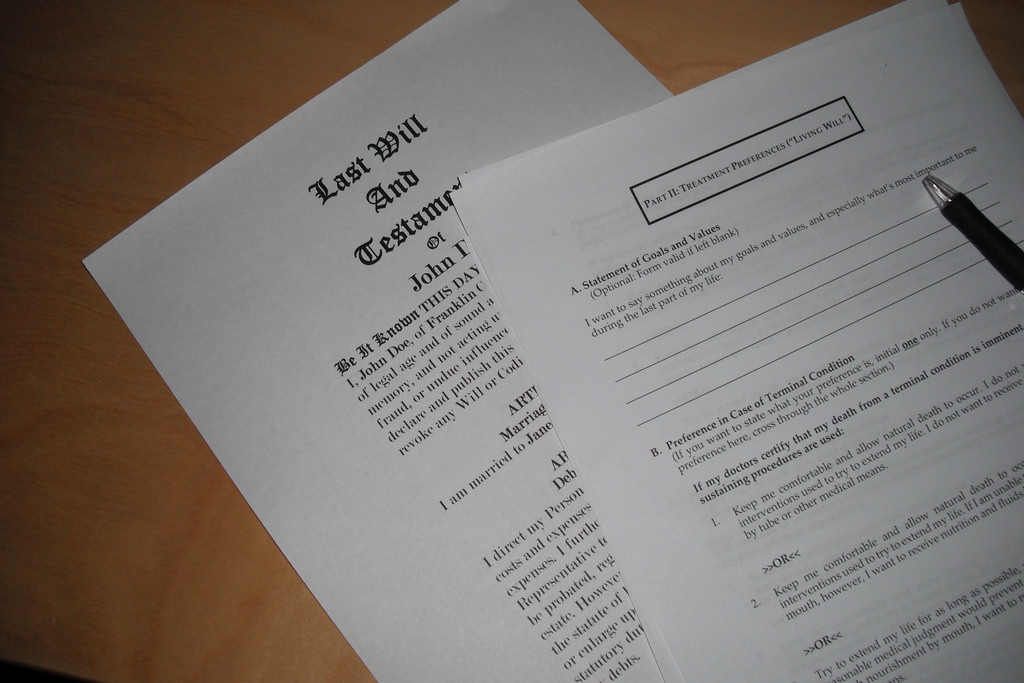Wills must meet several basic requirements to be valid and enforceable under state law. If any of the below factors are at work, then a will’s validity may be challenged.
(1) Undue Influence
Undue influence exists when a person uses coercion to influence the testator (the person creating a will) into executing a will that does not accurately reflect the testator’s true wishes. There are several red flags to keep in mind if you are suspicious a loved one’s will is the product of undue influence. Unusual dispositions of property, sickness and vulnerability of the testator to undue influence, disproportionate bequests to a suspected influencer, and/or the testator’s dependence on a suspected influencer for care and support are all warning signs that something may be amiss.
Other factors that juries may take into consideration:[1]
- Age;
- Physical condition;
- Mental condition;
- Dependence upon or association with the influencer;
- Opportunity to associate with persons other than the influencer;
- Relationship to the beneficiaries of the will;
- Writing is different form and purports to revoke a prior will; and
- The degree to which the deceased was influenced to execute the writing by the influencer.
Keep in mind, however, proving undue influence requires more than merely suggesting, advising, or persuading someone into changing or writing a will. Because the validity of a will cannot be challenged until the testator is deceased, direct evidence of undue influence is rarely available. North Carolina courts perform a fact intensive test in determining the existence of undue influence, considering “the surrounding facts and circumstances, which standing alone would have little importance, but when taken together would permit an inference that, at the time the testat[rix] executed [her] last will and testament, [her] own wishes and free will had been overcome by another.”[2] The best proof often comes from witnesses who knew the testator well, such as family members, doctors, and other close advisors.
(2) Diminished Mental Capacity/Not of Sound Mind
A testator must have capacity, or be of sound mind and memory, to execute a will. As mentioned in a previous blog post, there are different types and levels of diminished capacity. While adults are presumed to have the testamentary capacity to execute a will, litigation regarding the validity of a will typically involves the testator’s senility, dementia, insanity, or other unsoundness in mind. In essence, a testator of sound mind understands (1) how he or she is allocating their property, (2) what kinds of property he or she owns, and (3) who his or her relatives are that would presumably be benefiting of his or her will.
If a testator suffers from delusions or hallucinations, or if the testator no longer remembers his or her family due to a memory disorder, grounds may exist to challenge a will on the basis of diminished capacity. It is important to remember, however, the court will only examine the capacity of the testator at the time they executed the will. If a person is of sound mind at the time of execution, and later suffers from dementia, the court will deem the will valid. It is also possible a dementia patient may have moments of lucidity in which he or she has capacity to execute a will, a reality that further complicates any inquiry in this regard.
(3) Duress
If a testator was under duress when he or she executed a will, a will’s validity may be challenged. Duress occurs when a person commits a wrongful act or threatens a testator in order to force him or her to make a will they otherwise would not have made, even if the testator is fully aware of the nature and consequences of his actions. Proving duress can be difficult because a challenger must show that not only did a person use threats, but the testator believed the person to be willing, capable, and likely to follow through on those threats.
When considering whether a testator was under duress at the time they executed their will, juries will look at all the facts and circumstances surrounding the case including the following factors:[3]
- Age;
- Physical Condition;
- Mental Condition;
- Access to or opportunity to have independent advice;
- The fairness of the dispositions made by the will;
- The relationship between the testator and the alleged person exerting duress;
- The degree to which the person allegedly exerting duress sought or solicited the deceased to make the will; and
- The degree to which the testator was already susceptible to pressure or coercion by reason of personal distress or family emergency.
(4) Forgery
A testator must sign and date his or her will in the presence of at least two disinterested witnesses (i.e. people who do not stand to inherit as beneficiaries). Sometimes wills are challenged based on forgery, a form of fraud. However, such challenges require strong evidence that forgery occurred for the court to invalidate a will.
When a testator’s signature is at issue, handwriting experts are often consulted to analyze the signature and compare it to many samples of the testator’s known signature. If the expert reports the handwriting does not match, there is a presumption that forgery has occurred. Additionally, statements from the witnesses present at the signing of the will can also bolster forgery claims.
(5) Multiple Wills
The legal term of art “last will and testament” means just that; the will at issue is the most recent version and the testator has revoked all previous wills and/or codicils (i.e., amendments to wills). People often create several wills over their lifetime when circumstances change, such as getting married or having children. Wills may also necessitate change when children reach the age of 18, divorces are finalized, or there is a falling out with a particular family member.
When a person dies and his or her family finds a will in a safe place, such as a safe or deposit box, this is usually presumed to be the deceased’s last will and testament and presented to the court as such. However, sometimes more than one will or competing versions are found among the deceased’s possessions. This creates confusion and the court must step in to determine which will is the last will and testament.
When a new will is created, it usually contains a provision revoking all previous wills and/or codicils to avoid confusion. But, if no such provision exists, a subsequent will revokes earlier wills and codicils only to the extent they are inconsistent. If a subsequent will is determined to be completely inconsistent with an earlier version, the earlier will is considered revoked by implication.
(6) State Law Requirements Not Met
While many requirements for executing a valid will are common to all states, some are state-specific, so it is important to familiarize yourself with your own state’s requirements. In general, most states require wills to explicitly state it is the will of the testator and make at least one statement of substance, such as bequeathing a particular piece of property to another. Additionally, most states require the appointment of an Executor (sometimes called a Personal Representative) to be responsible for ensuring the testator’s wishes are carried out pursuant to the will. If a will lacks these provisions, it is likely susceptible to challenge in court.
Only half the states, including North Carolina, acknowledge the validity of holographic, or handwritten wills, but such wills are subject to additional requirements. In North Carolina, to be valid, a holographic will must be written entirely in the testator’s own handwriting, signed by the testator, evidence a testamentary intent, and be found with his or her valuable papers in a safe place, such as a safe deposit box or with a trusted advisor. [4] Three witnesses are required to validate a holographic will; two must testify the will is in the testator’s handwriting and one must testify it was found in a safe place.
North Carolina also acknowledges oral or “nuncupative” wills, but oral wills can only be used to dispose of personal property and cannot modify an existing written will. Additionally, oral wills are only valid if they are made when the testator is on his or her proverbial death bed, in front of two competent witnesses, and offered for probate within six (6) months of being spoken.[5]
As state law requirements vary greatly, it is advisable to contact an experienced attorney who knows your state’s laws and can assist you in drafting a will to avoid validity challenges upon death. Similarly, if you intend to challenge another’s will, an attorney can help you better understand the law and determine whether or not your claim has merit. To learn more about litigating wills, visit us at Lindley Law Office.
[1] N.C.P.I. Civil 820.20 (2006)
[2] In re Sechrest, 140 N.C. App, 464, 468-69, 537 S.E. 2d. 511, 515 (2000).
[3] N.C.P.I. Civil 860.22 (2002).
[4] N.C. Gen. Stat. § 31-3.4 (2015).
[5] N.C. Gen. Stat. § 28A-2A-10 (2015).



